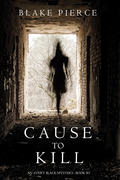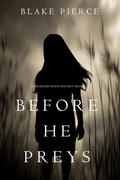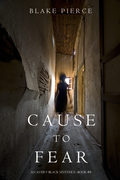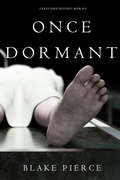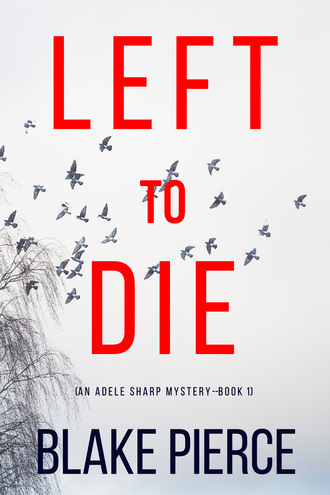
Блейк Пирс
Left To Die
CHAPTER TWENTY SEVEN
For the second time in the day, Adele burst through the door of Director Mueller’s office without invitation. Again, he was on the phone.
Mueller scowled at Adele and threw his hands to the heavens. “What?” he demanded.
Agents Renee and Marshall followed closely behind as Adele came to a halt in front of the standing desk and peered across the smooth, varnished surface, meeting Director Mueller’s glower. “Who disposes of your chemicals?” she asked.
“Excuse me?”
“I said, who handles the disposal of your chemicals? You can’t just throw them in the trash, right?”
Director Mueller frowned. “If you must know,” he said, testily, “we often incinerate, but sometimes we have contracts with agencies,”
Adele snapped her fingers, pointing one of them toward Mueller’s face. “That second part. What agencies?”
“Excuse me?” Mueller glanced back past her toward Agent Marshall. “I thought I had the BKA’s promise that I wouldn’t be harassed over this. We complied by supplying the records. You arrested one of my employees. Right now,” he wiggled the phone in his hand, “it’s a PR disaster. So if you don’t mind, I’d like to save this company before we lose contracts and go bankrupt.”
Adele studied the man, weathering his frustration with a deferential nod, polite, but firm.
“Is he saying something annoying?” said John in French, with a growl. “I can tell he’s saying something annoying.”
Adele responded, “He’s saying they do hire specialists to clean up their waste sometimes.”
After a brief, muttered exchange with Agent Marshall, which seemed to calm him somewhat, Mueller finally threw his hands up and turned back to his computer.
He glanced at a couple of things, then clicked his phone, surveyed it, and pressed a number.
“Audrey?” he said. “Yes, right now. Keep them on hold. Yes, I need you to look who was responsible for hazardous disposals for the last two months.”
Silence fell over the director’s office.
Adele glanced out the floor-to-ceiling windows, scanning the fields surrounding the gated company, on the outskirts of the German suburbs.
A minute passed, then two.
Adele gnawed on the corner of her lip, hoping she’d been right. A lot was riding on this.
Not only could the killer escape if she was wrong. But Interpol’s faith in her, faith in the collaboration between the DGSI, the BKA and the FBI, would be proven fruitless. Perhaps it would even cause difficulty arranging this sort of agency cooperation a second time.
After a few minutes, Director Mueller heaved an enormous sigh, his smooth forehead inching ever so slightly up, and he said, “Yes, two companies?” He lowered the phone. “Two companies were responsible for disposing of our chemicals these last two months.”
Adele felt her heart quicken. “Who was responsible for disposing of Project 132z?”
“One moment.” Director Mueller had the air of a man resigned to his fate. He lifted the phone again and parroted the question.
Another minute of pause, in which John tried to chat up Agent Marshall, but then Mueller returned with, “A local outfit,” he said. “Medical Waste and Sanitation. Now, if you don’t mind leaving my office… I don’t have employee records for their company, and I really do have to take another call. Audrey, my assistant, will give you the number and address for the disposal team on the way out, all right? All right.”
Then, ignoring them, he turned promptly, displaying his right shoulder toward Adele, and picked his phone up again, pressing it to his ear and ducking his head to make it abundantly clear that the conversation was over.
Adele turned toward John, her eyes glinting. “I was right; it’s a company called Medical Waste and Sanitation. They’re locals. They disposed of Lehman’s project.”
John stared at her. “You think a bunch of garbage men would’ve known what to do with those tubes?”
Adele shook her head. “I don’t think they’re regular sanitation crews. They work for a place like this, so I’m not sure they’re city-owned. I bet you one of them at the company was smart enough to know what they were looking at when they saw the disposed samples.”
“You think it’s a red-haired fellow?”
Adele shrugged. “We’ll have to find out. They don’t have employee records for the other company.”
John nodded, turning away from Adele and starting to move back toward the exit to the office.
“Marshall,” he said, “does the BKA have the ability to check records for us?”
Agent Marshall paused, chewed on her lip, then nodded. “Yes, just give me a moment.”
Both John and Marshall took their phones out, and Adele hurried after them, leaving Director Mueller to his peace.
It felt like their last shot. Adele couldn’t say why, but she knew that if this lead turned out to be a dead end, the killer would win. No other paths remained.
After this, Adele wouldn’t have any other place to go. She had to be right. Someone on that sanitation team was a killer, and she was determined to find out who.
CHAPTER TWENTY EIGHT
Sergeant Joseph Sharp reclined in his armchair, his eyes flicking from the outdated TV to the clock on the wall. Three hours had passed since Sharp’s visit.
Joseph watched a high-speed chase on the television with bland indifference, the red and blue lights on the screen pulsing and filling the room. A replay; he’d seen this one before—the no-good lawbreaker got his comeuppance. The Sergeant smiled at the thought, then, sighing to himself, he pulled the lever for the footrest and got to his feet.
“…for her own good…” he murmured quietly, continuing, out loud, a train of thought that had cycled through his mind the last three hours.
He glanced at the wall where his diploma from the police academy hung above newspaper clippings of the cases he’d been involved in. A hot flash of shame scoured his chest and he looked away in disgust, stomping into the kitchen.
Glowering, he turned on the hot water and began washing out his soup pot. On the counter, he spotted the canned soup Sharp had brought him. For a moment, as he eyed the can of soup, his movements became less agitated, and his internal monologue quieted.
“What?” he demanded of the soup can. He wagged a thick finger at the offending tin of creamed broccoli. He looked away and began washing the pot with large, agitated gestures, causing soapy water to splash against the inside of the metal sink.
Perhaps he was too hard on his daughter… But if he wasn’t hard, she’d end up like everyone else in her generation: lazy good-for-nothings, mooching off the government and their parents.
Joseph hesitated… Still, it had been nice she’d visited. Maybe he should give her a call…
He glanced toward the old-fashioned phone dangling from its cradle on the wall, but then he shook his head and redoubled his cleaning efforts. No. Compassion was all well and good, but emotions got in the way of a good investigator. He wouldn’t curse his daughter like that.
Once upon a time, he’d let his emotions get the best of him. He’d married a French girl—turned down a promotion to do it. Thirty years on the force and stuck as desk sergeant.
He rinsed off the pot and meticulously balanced it on the empty dry rack.
No; he wouldn’t condemn his daughter to his same fate. She never admitted it, but he knew she was ambitious. He would push her, because she needed it. Because comfort bred complacency.
He nodded to himself, pursing his lips as he turned back toward the TV. Enough screen for the day; where had he placed that book? He glanced around the kitchen and patted at his back pocket.
Just then, the doorbell rang.
Joseph frowned and turned. Had his daughter returned?
“Sharp?” he called out through the house, the glow of the internal lights offset, now, by the darkness creeping in through the shuttered windows.
No answer.
The doorbell rang a second time.
“Darn it,” he muttered with the same fervor a sailor might use to spew language that would have turned a priest’s cheeks rosy. Joseph Sharp didn’t believe in swearing, but the emotions behind the words? Outside his control.
And anything Sergeant Sharp couldn’t control was best ignored or destroyed.
The doorbell rang a third time and he picked up his pace, hurrying to the front door, shouting through the house. “Keep your shirt on! I’m coming. Darn it, Sharp—you know how I hate it when—”
He pulled open the door.
No one was there.
“Sharp?” he murmured, frowning and peering out into the night. His only greeting was the flicker of streetlights in the night and the ashy smell of a neighbor’s grill. He leaned forward, glancing to the side of the porch and down the patio steps. “Sharp—is that you?”
But he spotted no one. He glanced up the street, but the only car parked was the old green Nissan owned by the lady in 22C with that annoying, yip-yap mongrel.
The cool evening air gusted through the open door, sweeping toward Joseph Sharp and sending the hairs standing on the backs of his arms. Muttering darkly to himself, he began to close the door.
But just then, he heard a noise behind him. A creak of a floorboard. Sharp would have known not to ring the bell. She always knocked.
The Sergeant whirled around.
A man in a dark hood stood in his hallway, staring at him.
“Hello,” the man said in German with a polite smile.
“Who in the double hells are—”
“Good evening,” the man said.
Then his arm swung, there was a flash of metal, and something sharp jammed into Joseph’s neck with an ominous shnick. He cried out in pain and tried to defend himself, reaching up with surprising speed and ripping the needle from his neck. Already, the plunger had been half pressed, though. Joseph cried out, smashing the needle against the wall, feeling glass bite into his hand.
The hooded man snarled. “That was my last one!”
Darkness pressed in. He felt light-headed, his movements sluggish. Joseph tried to reach up, grabbing at the hooded man, but his arm moved far, far too slowly.
The hooded man surveyed the Sergeant for a moment, clicking his tongue as the larger man slid down the wall. “Half a dose might not be enough, hmm? You’re a big boy, aren’t you?”
Vaguely, Joseph could hear the sound of his door closing, followed by the quiet click of a lock.
CHAPTER TWENTY NINE
Adele glanced into the passenger’s seat at the printed page for the hundredth time in as many seconds. Her hands gripped the steering wheel, her heart pounding in tandem with the wild churning of her thoughts.
Porter Schmidt. The name at the top of the printed sheet. No photo—the waste department hadn’t had any. The operator couldn’t even describe what Schmidt looked like; apparently he worked remotely.
Adele growled in frustration. They would have to track down the suspects the hard way—door-to-door at night.
Porter Schmidt. Such a German name. One of three members of the waste disposal team who’d been tasked with destroying Project 132z. She had an address, a date of birth, and an identification number—nothing else. Records at Medical Waste and Sanitation were not up to the same standards of those of Lion Pharmaceutical. The operator hadn’t even known if any of the men had vacationed recently.
Adele wracked her brain, recollecting the other two names. John was already hunting down Michael Xavi, and Agent Marshall had taken the third borrowed vehicle to find Artem Ozturk. The men lived on opposite sides of the township, and if any of Adele’s teammates needed backup, it would take the others at least twenty minutes to arrive.
A lot could happen in twenty minutes.
Adele fidgeted uncomfortably in the seat of her loaner. At least she was no longer in the back of that ridiculous limousine. Adele had never worked with the BKA before, but—for the moment—they seemed accommodating enough. Though, she didn’t doubt for a minute that the car was being tracked by GPS, and the dashcam blinked red, suggesting there was a live feed going directly back to German headquarters.
Adele worked best without pressure and too much oversight, but she could perform for an audience as well. Her father was not an affectionate man, but he had taught her how to succeed under pressure. For that, she was grateful.
Adele kept within ten kilometers of the speed limit, following the chirping GPS directions to the address on the printed file.
For a moment, as she turned off the highway and took the curling exit over a bridge, she glanced in the passenger’s seat again and her eyes flicked to the rearview mirror, scanning the empty back seats. Strangely, she missed John.
Something about the tall, antagonizing agent had given her a sense of protection when shit hit the fan. Things were calm—almost too calm—as she sat in the car, studying the gentle flow of evening traffic. Most commuters had already returned home from work for the evening.
Still, despite it all, Adele felt like she was sitting on a powder keg, waiting for it to detonate. Agent Marshall had notified the appropriate units nearby to respond to calls for help, but still, if anything went wrong, the three agents were now on their own.
Michael, Artem, or Porter. Two innocent men who worked for a waste disposal crew were in for a rude interruption to their evenings. And, if Adele’s guess was right, one murderer knew they were coming for him.
She felt a shiver down her spine and, inadvertently, her foot pushed on the gas pedal and her vehicle picked up speed as she took a right turn onto a long stretch of road.
“Right turn in two miles,” chirped the GPS in German. “Then arrive at destination on left.”
Adele felt her stomach twisting and, keeping one hand on the wheel, her other reached down to her side, checking that her weapon was still on her hip.
Porter Schmidt. A one in three chance she’d chosen the lucky number.
Two miles to go until she found out. Her thoughts continued to cycle, and Adele continued to push slowly on the gas pedal, now speeding through traffic and racing toward her destination.
***
Splitting up had seemed like the right call earlier in the evening. They would cover more ground that way.
But now, in the dark of looming night, as Adele exited her vehicle and stepped onto the sidewalk before the aloof, old house, she wished she’d reconsidered.
The darkness pressed in around her like hounds snuffling at prey. Adele doubled-checked her shoulder radio which Marshall had provided when they’d split up. She glanced back toward the dash cam of the now quiet car; the red light was still blinking even though the key was in her pocket.
Someone was still watching.
Funnily, this bolstered Adele’s confidence. She hoped, if given a similar vehicle, John wouldn’t take it personally and react in the way she assumed he might. Paying for a damaged dash cam likely wasn’t high on Executive Foucault’s agenda.
She pressed the outgoing button on the radio and said, “Hello, is this thing working? Renee? Marshall? Are you at your targets yet?”
There was a pause, a quiet crackling sound, then John replied, “Stopped for a coffee,” he said. “And a donut. Will be there in five.”
Adele bit her lip, cutting off the cuss that burbled to the tip of her tongue. Her father’s influence stretched beyond the borders of his four neatly maintained walls. Still, she growled as she said, “We’re on the clock here, John—maybe a bit of professionalism—”
“Sorry, coffee just arrived. They take Euros in this country, don’t they?”
Adele stood on the sidewalk, feet at shoulder width, eyes narrowed now. Any sense of appreciation for John had faded to be replaced, once again, by annoyance at his lackluster approach to the job.
Before she could reply with a scathing remark, however, the radio buzzed again and Agent Marshall’s voice blared out, far too loudly, “It isn’t Mr. Ozturk,” Marshall said. “He lives in an apartment and his landlord and three separate neighbors all claim they’ve seen him in the last week. Plus, well…” Here Marshall trailed off for a moment as if she were gathering her thoughts then, in a tactful tone, she continued, “I’m not sure he’s in the physical capacity to subdue or harm anyone.”
John snickered and said, “Is he a fatty? Are you talking normal chub or American fat?”
Adele pressed the button again. “John, please, could you just hurry up?”
A pause. Static, then, “What about you, American Princess; we’re down to two, it sounds like. Is your man a red-haired devil?”
“Don’t know yet,” said Adele, glancing back up toward the old, well-maintained home. It was a busy street with cars zipping by every few moments, but otherwise, the house was normal looking enough. The grass was cut, the leaves raked, two trash cans were set out on the curb for collection.
“Should I come meet one of you?” said Agent Marshall’s voice.
Adele began to reply, but John beat her to it. “I’m closer. Come meet me. Afterwards, you can show me the best place to get drinks.”
Adele resisted the urge to gag. “Could you stop flirting, finish your coffee, and go check your man?”
John snickered. “Don’t forget the donut. It’s almost ready.”
Adele shook her head in defeat, but lowered her hand from the radio to her holster as she stalked toward the house. Her other hand went to her identification, preparing to lift it in introduction as she’d done many times before.
The investigative part was always easier. Adele had never been comfortable with a firearm, and even now she could feel old nerves coming back, threatening to derail her.
She inhaled deeply, then exhaled for a second longer, focusing on her breathing as she took the steps to the porch and raised a hand to knock on the door.
No answer.
She reached out and pushed the bell. A brief spurt of guilt caused her to cringe as she did. Her father’s influence had extended to bell-pushing. Christ, she thought to herself. How pathetic.
She pushed the bell a second time with more confidence, holding it longer this time.
But again, there was no answer.
Adele slowly unbuttoned her holster and sidestepped to the nearest window. She frowned, pressing her forehead against the cool glass.
Through the window, she spotted a tidy room with an old grandfather chair facing a fireplace and a long kitchen table with a laptop.
Her eyes narrowed, staring at the laptop, trying to register what she was seeing.
A face on the laptop stared back at her.
A face she knew.
“Shit,” she said, uttering the word in tandem with a huffing breath.
The laptop had a picture of her father’s face displayed on the LED screen. Adele’s gun ripped from its holster and she kicked at the door. Once, twice, leading with her heavy boot, but the door held firm. With an urgent huff of air, she sprinted around the side of the house and hopped a low, ridged wooden fence. Ignoring a bed of roses, she tore through the flowers and circled the backyard. A home gym was stationed beneath a tree, complete with a workout bench, weights and an old rowing machine beneath a tarp.
She ignored the strange set-up and surged toward the back door. This one was brittle, old—a wooden affair with chipped, flecked paint and a small glass semicircle which reminded her of the sections of an orange.
She kicked this door again, and again, desperately wishing she’d had John for backup.
Finally, with the third kick, on what felt like a sprained ankle, there was a splintering sound.
Adele felt a surge of exhilaration, coupled with dawning horror as she slammed her shoulder into the door and, with one final protesting crack, it gave way and swung inward.
She rushed into the room, sprinting over three neat sets of male shoes. She reached the kitchen table, her gun still raised, trained on the kitchen, then switching to the living room.
No one in sight.
She didn’t announce herself, but spun around the rectangular kitchen table and, breathing heavy, her shoulder and ankle pulsing with aches, she stared at the computer screen.
It was open to the Berlin PD website. Her father’s name and face filled the screen and her eyes flicked to the tabs of the browser: Google Maps was open. With a trembling hand, she lowered her gun, placing it on the table, and clicked the tab for the map.
A small red dot, like the laser on a sniper’s scope pulsed over a house in the suburbs.
She stared, scanning the map and her eyes flicking to the search bar.
It was her father’s address.
“Dear God,” she murmured, backing away from the table. Her hand fumbled in her pocket, but she finally managed to rip her phone from her pants and dial her father’s number. The cold blue screen blinked back a single word: Dad.
Once upon a time, she’d stored his name only as Joseph. But things had improved since then. At least, so she hoped.
Five rings. Six. Seven.
No answer.
She dialed again. Sometimes her dad ignored the phone, fearing telemarketers.
Another five. Six. Seven. Dial tone.
No answer.
A third try—still no answer.
Adele rammed her phone back into her pocket and she darted forward, one arm extended as she grabbed her gun; rapidly, she gave the house a cursory scan, one last time, then broke into a sprint, back out the rear door, hopping the splintered frame and racing back through the rose garden.
“John!” she shouted into her radio, “John—it’s Porter! Porter Schmidt is the killer. He’s going after the Sergea—my dad! John!”
She reached her car, swung open the door, and spilled into the seat, tossing her gun onto the passenger side. It took her three tries with trembling fingers to jam the key into the ignition and another couple of tries, with the engine groaning, for her to realize she still had the vehicle in neutral.
Cursing, Adele put the car in gear and tried to focus on breathing, to calm herself.
But the trick didn’t work this time.
Adrenaline met terror and did a number on her mind, sending her into a vortex of worry and fear. A physical clot of anxiety pulsed in her chest. Her dad. The killer was going after her dad.
She thought of her norther. Ribbons of red extending from the once beautiful woman, staining the clover leaves and blades of grass, spilling into the sodden ground in the park. A tapestry of swirling scars up and down her body.
“Fuck!” Adele shouted as she ripped from the curb and nearly hit a park bench. “Dammit!” She tore up the street, ignoring a vehicle half-pulled out of the driveway. The driver leaned on his horn in protest, but Adele ignored that too and floored the gas pedal, tearing through a stop sign and roaring up the street.
She’d just been at her father’s place. Had she missed him? Would she be too late?
No. No, she couldn’t think like that. She couldn’t be too late. Not this time. Please, God, not this time…
“John!” she repeated, slapping at the radio. “Where are you?”
A buzz, some static. Then, “Sharp? What is it?” Some of the joviality had faded from John’s voice. “Adele, are you okay?”
Tears were now streaming down her face. For a moment, Adele felt twenty again. Little more than a child, weeping at the news of her mother.
No. Not this time. Not her father too.
Still, she sobbed, trying to maintain professionalism, trying to suppress the emotions like she always did and always could. Emotions caused weakness. Emotions were distractions for an investigator.
But she couldn’t push back the kaleidoscope of horrible images now playing themselves across her brain, suggesting all the coulds and what-ifs of the immediate future. Each thought brought a new wave of emotion and a new surge of speed as Adele ripped through traffic, receiving more than one blare from a horn. At last, she remembered to flip on her lights and siren—the BKA had been kind enough to at least supply that.
Siren wailing now, blue and red flashing across the glinting windshield and hood of her car, she zipped beneath a red light, surging back onto the highway, heading in the direction of her father’s house.
“No,” she said. “John—John he’s going after my dad. It’s Porter. He’s going after my father!”
A pause. Then, a serious voice. “You’re sure?”
Her voice cracked. “ Yes, John, please—”
“Where does your father live?” he rattled off, his voice becoming colder, more calculated. The voice of a military man in the middle of a high-stakes operation.
Adele recited her father’s address from memory, her eyes glued to the road as she wove in and out of traffic.
There was a staticky buzz, then John, sounding out of breath now as if he were running, said, “I’m on my way. Don’t do anything stupid.”
“John, it’s my dad.”
“Damn it, Adele, I know.” The distant slamming sound of a car door interrupted through the static. “Just wait for me. Okay? Promise me you’ll wait.”
Adele didn’t reply. She gripped the steering wheel, no longer attempting to suppress her emotions, but stewing in them as she sped through the city, racing toward her father’s house and into the waiting arms of a killer.



